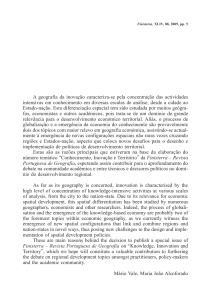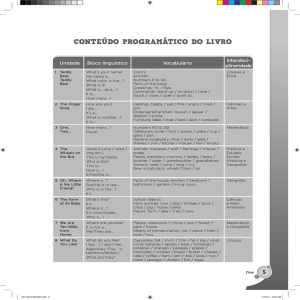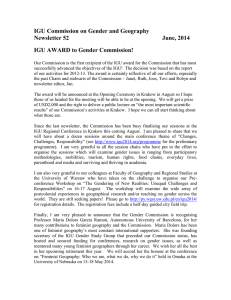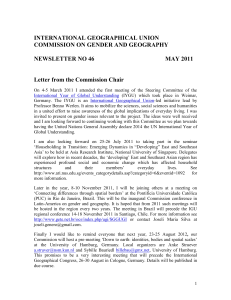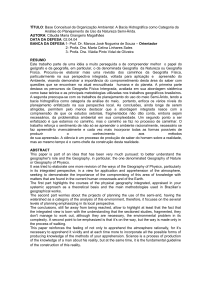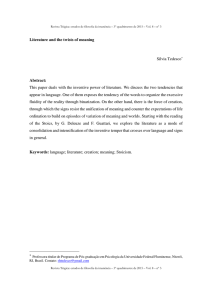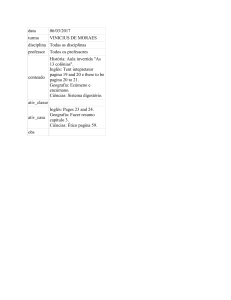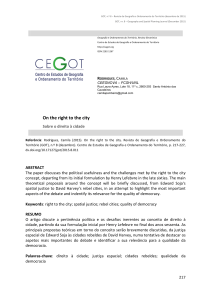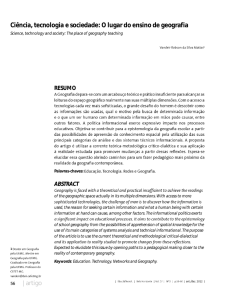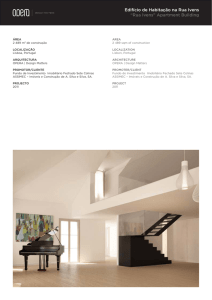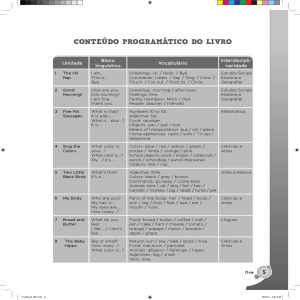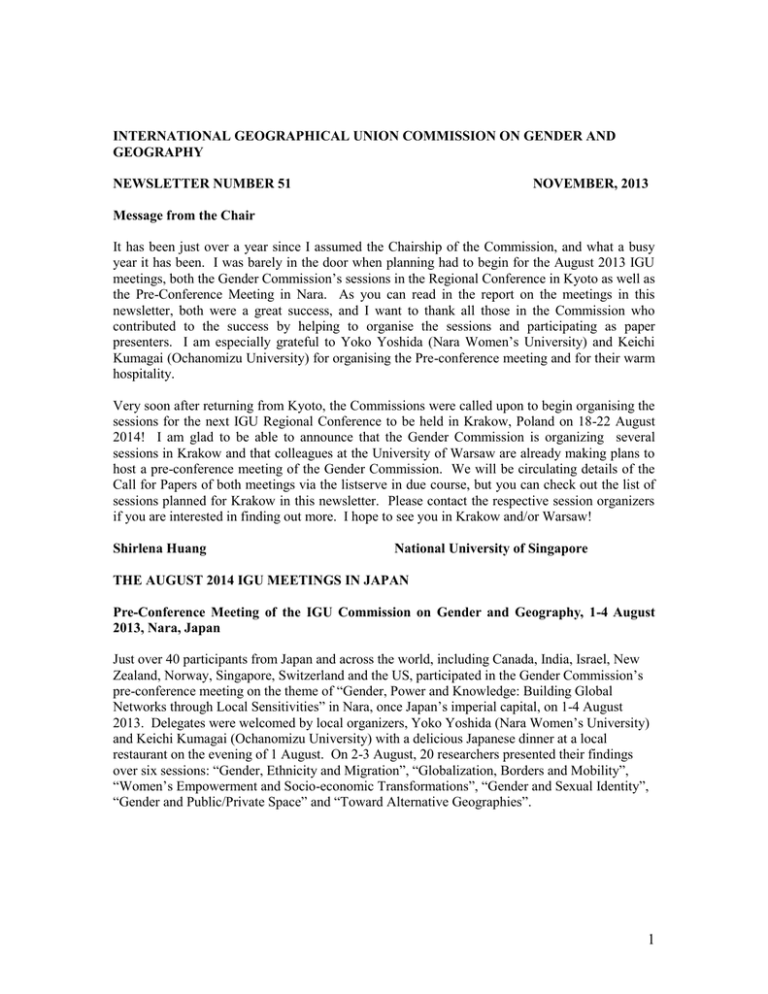
INTERNATIONAL GEOGRAPHICAL UNION COMMISSION ON GENDER AND
GEOGRAPHY
NEWSLETTER NUMBER 51
NOVEMBER, 2013
Message from the Chair
It has been just over a year since I assumed the Chairship of the Commission, and what a busy
year it has been. I was barely in the door when planning had to begin for the August 2013 IGU
meetings, both the Gender Commission’s sessions in the Regional Conference in Kyoto as well as
the Pre-Conference Meeting in Nara. As you can read in the report on the meetings in this
newsletter, both were a great success, and I want to thank all those in the Commission who
contributed to the success by helping to organise the sessions and participating as paper
presenters. I am especially grateful to Yoko Yoshida (Nara Women’s University) and Keichi
Kumagai (Ochanomizu University) for organising the Pre-conference meeting and for their warm
hospitality.
Very soon after returning from Kyoto, the Commissions were called upon to begin organising the
sessions for the next IGU Regional Conference to be held in Krakow, Poland on 18-22 August
2014! I am glad to be able to announce that the Gender Commission is organizing several
sessions in Krakow and that colleagues at the University of Warsaw are already making plans to
host a pre-conference meeting of the Gender Commission. We will be circulating details of the
Call for Papers of both meetings via the listserve in due course, but you can check out the list of
sessions planned for Krakow in this newsletter. Please contact the respective session organizers
if you are interested in finding out more. I hope to see you in Krakow and/or Warsaw!
Shirlena Huang
National University of Singapore
THE AUGUST 2014 IGU MEETINGS IN JAPAN
Pre-Conference Meeting of the IGU Commission on Gender and Geography, 1-4 August
2013, Nara, Japan
Just over 40 participants from Japan and across the world, including Canada, India, Israel, New
Zealand, Norway, Singapore, Switzerland and the US, participated in the Gender Commission’s
pre-conference meeting on the theme of “Gender, Power and Knowledge: Building Global
Networks through Local Sensitivities” in Nara, once Japan’s imperial capital, on 1-4 August
2013. Delegates were welcomed by local organizers, Yoko Yoshida (Nara Women’s University)
and Keichi Kumagai (Ochanomizu University) with a delicious Japanese dinner at a local
restaurant on the evening of 1 August. On 2-3 August, 20 researchers presented their findings
over six sessions: “Gender, Ethnicity and Migration”, “Globalization, Borders and Mobility”,
“Women’s Empowerment and Socio-economic Transformations”, “Gender and Sexual Identity”,
“Gender and Public/Private Space” and “Toward Alternative Geographies”.
1
International participants of the Pre-conference meeting on a tour of the
105-year-old Nara Women’s University campus.
The presentations encompassed a diversity of topics and issues, including gender and labour, the
queering of public spaces, the formation of migrant communities, the creation of national
identities, rural development, and changes in social structures and gender relations following
processes of neo-liberalization. In the discussions, focus was also given to discussing the building
of cross-boundary research and the complexities of building qualitative international research.
Participants also reflected on the lack of quantitative and GIS-related research projects within
feminist geography. Befitting the theme of the Gender Commission on “Scaling Gender: From
the body to the globe”, the papers contextualized gender politics at various scales and highlighted
the production of new spatialities in relation to local and global linkages.
Also included in the sessions at Nara were two rounds of very fruitful small group discussions
followed by presentations to share the ideas generated. On 2 August, participants reflected on
issues raised in a Japanese television documentary on “Women Keep the World Turning: 40
Years, A Time for Change” which followed the daily lives of 5 women from Japan, France,
Kenya, China and the US respectively. On 3 August, participants divided into groups to discuss
the issues raised by the pre-conference meeting, the deconstruction of feminist geographies that
are rooted in Western-centric viewpoints, ways in which male researchers can participate in
feminist geographies, how researchers can best respect local sensitivities, as well as the common
challenges related to expectations of professional performance and how they relate to difficulties
of international collaboration.
2
Preparing to embark on our fieldtrip to South Osaka
On the final day, 24 participants attended a half-day field trip to south Osaka’s downtown
districts of Kamagasaki, Tobita and Abeno. In Kamagasaki, many of us were surprised to see the
large congregation of male day laborers and out-of-work homeless men. We then proceeded
through Tobita, the largest red-light district in western Japan characterized by brothels and
restaurants from a bygone era, to the starkly contrasting district of Abeno where gentrification
due to redevelopment is progressing rapidly. After lunch in Osaka’s Korea Town, most of us
proceeded to Kyoto for the IGU 2013 Regional Conference.
IGU 2013 Kyoto Regional Conference, 4-9August 2013, Kyoto, Japan
We joined over 1,400 other geographers who had congregated in Kyoto for the main conference
focused on the theme of “Traditional Wisdom and Modern Knowledge for the Earth’s Future”.
The Gender Commission had a packed schedule, with seven sessions dedicated to the theme of
“Gender and Geography” (a total of 22 papers were presented on the sub-themes of
“Intersectionality”, “Sexualities, sex, space and place”, “Gender, risk and global change”,
“Gendering urban spaces”, “Women and Work”, “Teaching and Learning” and “Emerging
themes”) and two sessions organized jointly with the History of Geography Commission on the
“History of Geography, Geographical Thought, and Gender” (with eight papers).
We also held a very well-attended panel discussion on “Working Together: Challenges and
Strategies for Collaborating across Boundaries”. After each panelist shared their thoughts on the
subject, audience members formed working groups to discuss how the topic applied to their
respective contexts. Issues raised by the panelists and groups included the various types of
boundaries that need to be crossed (such as national, linguistic, disciplinary, institutional, and
research vs teaching), as well as the need for sensitivity to power differences and for spaces of
collaboration to be spaces of trust and flexibility to working differently in different settings.
Participants were also informed about the shared resources for teaching at the Center for Global
Geography Education (www.aag.org/cgge).
3
Jan Monk introducing the panelists (Ragnhild Lund, Joos Droogleever Fortuijn and
Michael Solem) for the session in Kyoto on “Working Together: Challenges and Strategies
for Collaborating across Boundaries.”
We ended with an Open Business Meeting at which we discussed, among other issues, several
forthcoming conferences being organized by members of the Commission in different parts of the
world, including Brazil, India and the UK, as well as plans for the next IGU Regional Conference
in Krakow, Poland, scheduled for18-22 August 2014. With new attendees at the business
meeting signing up to be on our electronic mailing list, we managed to add a couple of dozen new
members (both faculty and graduate students) to the Commission.
Overall, the quality of papers, presentations and discussions across all sessions made for very
productive meetings for the Geography and Gender Commission in both Nara and Kyoto. There
was a good sense of camaraderie and a strong spirit of support. Several young scholars
mentioned how they appreciated that the Commission’s sessions presented a “safe space” to share
their views, network, and learn from other feminist geographers. The success of both meetings is
a good signal for the future of our Commission and we look forward to another successful set of
meetings in Poland in 2014.
Shirlena Huang (National University of Singapore), Chair IGU Commission on Gender and
Geography
Yoko Yoshida (Nara Women’s University), Co-organizer, Pre-Conference Meeting
Milena U. Janiec-Grygo (University of South Florida)
October 2014
NEWS FROM AROUND THE WORLD
Celebrating 100+ years of Women in Geography at the Royal Geographical Society
4
The August, 2013 annual conference of the Royal Geographical Society (RGS) (with the Institute
of British Geographers) held in London, August 27-30, was a special event in the history of
women’s geographic work. It commemorated 100 years of women’s admission to membership in
the RGS and the continuing work of today.
A dozen paper, panel, and sponsored sessions were designated as 100+ events. They
included themes on contemporary issues such as “Gender and Justice – Everyday Frontiers,”
“Gender, Migration, and Mobility”, “Gender and Spaces of Empowerment in Tourism. Looking
back, a session reflected on historical experiences of women as geographers, “Gendered Frontiers
in Geographical Knowledge and Practice” while another displayed and discussed selected objects
in the RGS archival collections and gendered aspects of their acquisition and interpretations.
Additiomally, The Gender, Place and Culture annual lecture, generally given at the Assocation of
American Geographers annual meeting was given this year at the RGS/IBG by Melissa Wright
(Pennsylvania State University) on the theme “Feminicidio, Narcoviolence, Profit: The Feminist
Fight on Mexico’s Border,” followed by a reception sponsored by the journal’s publisher.
To further the celebrations and to honor women who pioneered in British academic geography,
attendees were given the opportunity to write celebratory 100+ “postcard messages to
geographers who had been important mentors for them. Over 220 cards were written by those at
the meeting. Additionally a set of 7 photogtaphic buttons were distributed to honor British
women geographic “foremothers” including: Isabella Bird, Eva Taylor, Alice Garnett, Cuchlaine
King, Doreen Massey, Sophie Bowlby, and Janet Momsen.
Christian Berndt and Karin Schwiter (University of Zurich) received a grant from the Swiss
National Science Foundation for a three year project on "Care Markets. The role of care agencies
in the commodification of elderly care." Theproject outline may be accessed at
: http://www.geo.uzh.ch/fileadmin/files/content/abteilungen/wgg/About_us/Staff/Documents_Staf
f/Karin_Schwiter/Completed_Projects/CareMarkets_ProjectSummary.pdf
More than 15 papers on gender,integrated into other thematic sessions,.were presented at the
Annual Meeting of the Canadian Association of Geographers held in St Johns, Newfoundland
in August, integrated into other thematic sessions. Recognizing current concerns one session was
devoted to “Feminist Approaches to Health and Health Care” with papers on “Possibilities and
Limits of Material Feminisms to the Feminist Geographies of Health Care,” “Nurse 'Shortages'
and the Social Reproduction of American Health Care,” and “Mobilizing Low-Income Aboriginal
Women’s Right to Food in the City.” Other recurring themes were the subject of “home” ranging
from work on domestic violence to issues for elderly living alone, home care workers, and
homemaking strategies of undocumented women living in the Netherlands The annual student
paper competition award went to Reiko Obokata, (University of Ottawa), for her paper "Natural
In-Security: Posthumanism and Environmental Refugees.". The conference program may be
accessed at http://www.mun.ca/cag2013/CAG2013_programme_June26.pdf Also of interest is a
feminist blog about experiences as women in Canadian universities: http://www.hookandeye.ca/
The AK Geographie und Geschlecht (German-speaking gender and geography group)
has launched a gender equality initiative in the German Association of Geographers
(VGDH). The initiative has been discussed at the Deutsche Geographentag (the biannual
meeting of German Geography) and the general assembly of the VGDH approved the
5
initiative. As a consequence, a task force will conduct a quantitative survey about gender
equality in German Geography Departments and formulate gender equality aims.
Congratulations to Sara Kindon, Human Geography and Development Studies at Victoria
University of Wellington, Aotearoa/New Zealand who has received three awards and a promotion
in 2013. The first award was a VUW Public Contribution Award for her role in University, citywide and national initiatives advocating for and with refugee-background students. The second
was a Deans' Excellence Award for her work as Geography Programme Director working for
widespread curriculum changes to strengthen teaching and postgraduate research in Geography.
The third was from the New Zealand Geographical Society for the Best Doctoral Thesis in 2013
for her dissertation entitled: 'Thinking-through-Complicity': Towards a Critical Use of
Participatory Video for Research' (Waikato University, 2012), and her recent promotion was to
Reader/Associate Professor.
Congratulations to Carolin Schurr who has been awarded a prestigious multi-year
postdoctoral fellowship from the Branco Weiss society for my project: Transnational
Economies of Assisted Reproduction (500.000 CHF).. Carolin is currently pursuing
research in Guatemala.
On October 16, the Autonomous University of Barcelona honored Jan Monk
(University of Arizona) with Doctor Honoris Causa (honorary doctorate). The award
cited her international contributions to gender and feminist geography, engagement with
qualitative research in social and cultural geography and extensive and long term
fostering of international ties in the discipline. It also noted appreciation for her long-term
association with geographers at the Autonomous University both on the campus and in
supporting members of the University in her home institution and other settings. In an
extended introduction (laudatio) Maria Dolors Garcia-Ramon noted that this was only
the second time in the history of the University that a geographer had been recognized
with this award. The ceremony also included an invited presentation by “Doctora” Monk
on the theme of what motivates scholars to pursue particular paths, in the process
drawing on illustrations from her personal experiences.
NEW BOOKS
Bhattacharyya, Ritupana. 2013. Are We Empowered? Stories of young Indian working women,
Saarbrücken, Germany: Lap Lambert Academic Publishing, ISBN: 978-3-659-20580-4
Bradshaw, Sarah. 2013. Gender, Development and Disasters. Cheltenham UK: Edward Elgar.
Cattan, Nadine, and S. Leroy 2013. Atlas mondial des sexualités. Libertés, plaisirs et interdits.
Ed. Autrement.
Fudge, Judy and Kendra Strauss. (eds) 2013. Temporary Work Agencies and Unfree Labour:
Insecurity and the New World of Work. London: Routledge.
6
Lund, Ragnild, Kyotra Kasatabe, Smita Panda, and Yun Xian Wang. 2013. Gender, Mobiliites
and Livelihood Transformation; Compaiing Indigenous People in China, India, and Laos.
London: Routledge.
Molloy, M and W Larner (2013) Fashioning Globalisation: New Zealand Design, Working
Women and the Cultural Economy. Wiley Blackwell RGS-IBG Series. ISBN 9781444337013
Oso, Laura and Natalia Ribas Mateos. 2013. The International Handbook on Gender, Migration
and Transnationalism: Global and Development Perspectives. Cheltenham, UK. Edawrd Elgar.
Peake, Linda and Martina Rieker (eds). 2013. Rethinking Feminist Interventions into the
Urban.London: Routledge.
Silva, Joseli Maria and Marcio Jose Ornat e Alides Baptista Chimin Junior (eds.). 2013.
Geografias Malditas. Corpos, Sexualidades e Espaços. Ponta Grossa: TodaPalavra.
Dina Vaiou and Costis Hadjimichalis 2012. Space in Radical Thinkimg. Athens: Nicos
Poulantzas Institute/Nissos Publ.
SPECIAL JOURNAL ISSUES
A selection of papers from the IGU Commission on Gender meeting held in Ein Karem.
Jerusalem, in 2010 appears under the theme “Bridging Gendered Diversity in a Globalizing
World” in a theme issue of .”Hagar: Studies in Culture, Politics, and Identities 11 (1), 2013
guest- edited by Orna Blumen, Tovi Fenster, and Chen Misgav. It includes articles from seven
countries, ranging among others from themes of migrant women’s experiences of food and
eating in New Zealand to expressions of masculinity by young men in Japan, historical
expressions of the Arab home in Beirut, to changing relationships between women’s paid work
and civic engagement in the Netherlands. A full listing of articles in included below. The issue
also includes five book reviews. It offers a sampling of the excellent presentations and
discussions in the calm and gracious former monastery of the Sisters of Zion in a village outside
the city of Jerusalem. Thanks to Tovi Fenster, Orna Blumen and Chen Misgav for editing this
collection, to the editors of Hagar for supporting this special issue of the journal.
ACME: An International E-Journal for Critical Geographies 2, (2) 2013. is a theme issue
including focusing on “Sexual Landscapes, Lives, and Livelihoods in Canada” edited by
Catherine J. Nash and John P. Catungal. It may be accessed at http://www.acmejournal.org/vol12.pdf. See below for individual articles.
Social and Cultural Geography 14(5) 2013. offers a themed section on “Gender Spaces of
Commoditised Care.” See individual articles below and
http://www.tandfonline.com/toc/rscg20/14/5#.Ulug3FCsjAk
Journal of interest: Genre, Sexualité & Société(http:gss.revues.org) is an electronic
multidisciplinary and international review pblished in French twice per year co-edited by
Marianne Blidon and Sébastien Roux. Submissions a re peer reviewed. The journal has been
published since 2009. Recent issues have addressed such themes as the social construction of
7
homosexuality, rituals, and .AIDS. Further information is available from [email protected]
RECENT ARTICLES AND BOOK CHAPTERS
Abu-Rabic Queder and Yuval Karplus. 2013. Regendering space and reconstructing identity:
Bedouin women’s translocal mobility into Israeli-Jewish insitutions of higher education.”
Gender, Place and Culture 20 (4): 470-86.
Aguilar de Oliveira Cesar Tamires and Vinicius Cabral. 2012. “Sexualidades nas geografias ao
sul do Equador.” Revista latino-american de Geografia e Gênero 3(2): 174-77.
Azalanshah Md Syed. 2013. “Malay women as discerning viewers: Asian soap operas, consumer
culture, and negotiating modernity.” Gender, Place and Culture 20 (5). 647-63.
Bagheri, Nazgol. 2013. “Mapping women in Tehran's public spaces: a geo-visualization
perspective.” Gender, Place & Culture:, DOI: 10.1080/0966369X.2013.817972.
Bennett, Luke. 2013. “Who goes there? Accounting for gender in the urge to explore abandoned
military bunkers”. Gender, Place and Culture 20(5): 630-46
Bhattacharyya, Ritupana. 2013. “Criminal Law (Amendment) Act, 2013: Will it ensure women’s
safety in public spaces? Space and Culture, India, 1 (1), 13-27,
Bhattacharyya, Ritupana and Polly Vauquline. 2013., A mrage or a rural life line? Analysing the
impact of Mahatma Gandhi Rural Employment Guarantee Act on women beneficiaries of Assam,
Space and Culture, India, 1(1), 83-101.
Bhattacharyya, Rituparna, M.L.Meena, and S.Singh. 2013. “Some reflections of the geographies
of Socio-Economic Impact of the Kosi River Floods, 2008, Journal of Earth Science and
Engineering 1, 57-65,
Billom, Emily and Nancy Hiemstra. 2013. “Mediating messiness: expanding ideas of flexibility,
reflexivity, and em.bodiment in fieldwork.” Gender, Place and Culture. 20 (3): 313-28.
Blumen, Orna, Tovi Fenster, and Chen Misgav. 2013. “Introduction: Bridging gendered diversity
in a globalizing world.” Hagar: Studies in Culture, Politics, and Identities 11 (1):2-5.
---. “The body within home and domesticity: Gendered diversity.” Hagar: Studies in Culture,
Politics, and Identities 11 (1):6-19.
Bolvin, Renaud René. 2013. “Rehabilitación Urbana e Gentrificación en el Barrio de Chueca: la
Contribución Gay.” Revista Latino-americana de Geografia e Gênero 4(1): 114-124.
----. 2013. De Cantinas, Vapores, Cines e Discotecas: Cambios, Rupturas e Inercias en los Modos
y Espacios de Homsocualización de la Ciudad de México. Revista Latino-americana de
Geografia e Gênero 4 (2): 118-33.
8
Boulevard, Glacia. . 2013. “Vida de travesti é luta! Luta contra a morte, luta contra o preconceito,
luta por sobrevivência e luta por espaço”, in Joseli Maria Silva, Marcio Jose Ornat e Alides
Baptista Chimin Junior (eds.). Geografias Malditas. Corpos, Sexualidades e Espaços. Ponta
Grossa: TodaPalavra, 69 – 81.
Boyer, Kate, Suzanne Reimer, and Lauren Irvine, 2013, “The nursery workspace, emotional
labour, and contested contestation of commoditised childcare in the contemporary UK.” Social
and Cultural Geography 14 (5): 517-40.
Brown, Gavin. 2013. Pensando Além da Homonormatividade: Explorações Performativvas de
Economias Gays Diversificadas.” Revista Latino-americana de Geografia e Gênero 4(1): 125-38.
Bruno Mundim, Maria Célia, Solange Muglia Wechsler, Tatiana Nakano Primi. 2013.
“Liderança Feminina: O Estado da Arte nas Publicacöes Brasileiras.” Revista Latino-americana
de Geografia e Gênero 4(2): 55-65.
Bush, Vicky. 2013. “ The employment of migrant nirses un th UK: Negotiating social class in an
open market for commoditised in-home care.” Social and Cultural Geography 14(5) 541-57.
Carbó, Monica, Mireia Baylina and Maria Dolors Garcia-Ramon. 2013. “Women’s ventures in a
rural context: livelihood and identity, ”Hagar: Studies in Culture, Politics, and Identities 11 (1):
100-120
Cabral, Vinicius, Joseli Maria Silva, and Marcio Jose Ornat. 2013. “ Espaços de morte e
representaçöes sociais de travestis na cidade de Ponta Grossa.” Revista Latino-americana de
Geografia e Gênero 4(1): 139-61.
Cabral, Vicinius, Joseli Maria Silva e Marcio Jose Ornat. 2013. “Espaço e morte nas
representações sociais das travestis”, in Joseli Maria Silva, Marcio Jose Ornat e Alides Baptista
Chimin Junior (eds.). Geografias Malditas. Corpos, Sexualidades e Espaços. Ponta Grossa:
TodaPalavra, 273 – 307.
Cabral da Silva, Rachel. 2013. “Desejo de Cidade e Sociabildade Negra.” Revista Latinoamericana de Geografia e Gênero 4(1): 162-74.
Cardoso Lopes, Marilia and Susana Maria Veleda da Silva. 2013. “Da Paixão ao Crime: Uma
Espacializacão da Violència contra as Mulheres en Rio Grande –RS. Revista Latino-americana
de Geografia e Gênero 4(1): 58-74.
Cattan,, Nadine and A. Vanolo, 2013. "Gay and lesbian emotional geographies of clubbing:
reflections from Paris and Turin"Gender, Place & Culture: A Journal of Feminist Geography,
http://www.tandfonline.com/eprint/2M5UTemdSGwtMqskI2uC/full
Catungal, John Apul. 2013. “Ethno-Specific Safe Houses in the Liberal Contact Zone: Race
Politics, Place-Making and the Genealogies of the AIDS Sector in Global-Multicultural
Toronto, ACME: An International E-Journal for Critical Geographie 12(2): 250-78.
http://www.acme-journal.org/vol12/Catungal2013.pdf
Chant, Sylvia.2013. “The long shadow of ‘smart economics’: The making, methodologies and
messages of the World Development Report 2012,” in Laura Oso and Natalia Ribas-Mateos (eds)
9
The International Handbook on Gender, Migration and Transnationalism: Global and
Development Perspectives (Cheltenham: Edward Elgar), pp.97-126.
Chant, Sylvia .2013. “Gender – Is one goal enough?” In United Nations Association –UK (eds)
Global Development Goals: Leaving No-one Behind (London: Witan Media), 85-88.
Chant, Sylvia and Katherine Brickell. 2013. “Domesticating (and ‘de-patriarchalising’) the
development agenda: A need for greater household (and family) engagement in gender-related
policy interventions?:” in Shirin Rai and Georgina Waylen (eds) New Frontiers in Feminist
Political Economy. London: Routledge.
Chant, Sylvia and Cathy McIlwaine. 2013. Gender, Urban Development and the Politics of
Space, e-International Relations (http://www.e-ir.info/2013/06/04/gender-urban-developmentand-the-politics-of-space/
Cheong-Yi, Hyun Soon Park, Soon Young Lee, and Seung-jun Moon. 2013. “Sexual harassment
in Korean college classrooms: how self-construal and gender affect students’ reporting behavior.”
Gender, Place and Culture 20 (4): 432-50.
Chouinard, Vera. 2013. “Precarious lives:in the global South: On being disabled in Guyana.”
Antipode. DOI 10.1111.anti.12046.
Colin, Frances-Lise. 2013. “Commodification of indigenous crafts and reconfiguration of gender
identities among the Emberá of Panama.” Gender, Place and Culture 20 (4): 487-509.
Cox, Rosie, 2013. “Gendered spaces of commoditised care. Social and Cultural Geography
14(5): 491-00.
----. 2013. “The complications of ‘hiring a hubby’: Gender relations and the commodification of
home maintenance in New Zealand.” Social and Cultural Geography 14(5) 575-90.
da Silva Leal, Jackson. 2013,. “Sobrecarga de Planos de Opressão e o Encarceramento Feminino
no Sul do Rio Grande do Sul.” Revista Latino-americana de Geografia e Gênero 4(1): 36-47.
Datta, Ayona. 2013. “gendered nature and urban culture: The dialectics of gated developments in
Izmir, Turkey.: International Journal of Urban and Regional Research DOI: 10.1111/14682627.12081
Davis, Deborah and Kim Walker. 2013. “Towards an ‘optics of power;: technologies of
surveillance and discipline and case-loading midwifery practice in New Zealand” Gender, Place
and Culture. 20(5): 597-812.
DeLyser, Dydia and Wendy S. Shaw. 2013, “For menopausal geographies.” Area DOI.1111/area
12059.
Di Feliciantonio, Cesare. 2013, “Se Necesita las Palabras para Decirio La Marginalización de la
Geografia de Género y de la Sexualidad en Italia: Entrevista con Rachele Borghi.” Revista
Latino-americana de Geografia e Gênero 4(2): 173-78.
10
Di Feliciantonio, Cesare, Francisco dos Santos, Ednélia and Eliane Rose Maio Braga. 2013. “
Questão do Gênero nas Brincadeiras Infanta: un Estudio de Caso.” Revista Latino-americana de
Geografia e Gênero: 4(1): 103-113.
Diaz Carrión, Isis Arlene. 2013. Mis hijos se quedan allá”: Estrategias cotidianas de mujeres
urbanas que trabajan en el turismo de aventura en ‘Rio-Tlan’ –México." Revista LatinoAmericana de Geografia e Gênero, 4 (2) 45-54.
http://www.revistas2.uepg.br/index.php/rlagg/article/view/4818/pdf_73
----. “Mujeres y mercado de trabajo del turismo alternativo en Veracruz.” Economía, Sociedad y
Territorio, XIII,(42): 351-80.
http://www.redalyc.org/articulo.oa?id=11126608003
----. “Nosotras también hacíamos descenso”: Rescatando a participación de las mujeres en el
descenso de río con fines turísticos y deportivos en Jalcomulco (Veracruz, México)” Journal of
Latin American Geography, 12 (2),: 151-70.
Diprose, Gradon, Amanda C. Thomas, and Renee Rushton. 2013. :Desiring more: Understanding
of sexuality in research processes.” Area 45(3): 292-98.
Dos Santos, Moreira Marcos. 2013. “Bandas de Música e Gênero: Uma Busca da Ativa
Participacão de Mulher Nordestina.” Revista Latino-americana de Geografia e Gênero: 4 (2):
66-76.
Droogleever Fortuijn, Joos and Frans Thissen. 2013. “ The changing relationship between civic
engagement and paid work of women in rural areas in the Netherlands, 1993-2007.” Hagar:
Studies in Culture, Politics, and Identities 11 (1) 82-99.
England, Kim and Caitlin Henry. 2013. “care work, migration, and citizenship: International
nurses in the UK.” Social and Cultural Geography 14(5):
Evans, Sarah L., Innes Keighren and Avril Maddrell. 2013. “Coming of age? Reflections on the
centenary of women’s :admission to the Royal Geographical Society. The Geographical Journal
DOI.1111/geoj/12051
Faier, Lieba. 2013. “Affective investment in the Manila region: Filipina migrants in rural Japan
and transnational urban development.” Transactions of the Institute of British Geographers 38(3):
376-90.
Fannon, Maria. 2013. “The burden of choosing wisely: biopolitics at the beginning of life.”
Gender, Place and Culture. 20 (3): 273-89.
Fenster, Tovi. 2013. “Bodies and places in Jerusalem: Gendered feelings and urban policies.”
Hagar: Studies in Culture, Politics, and Identities 11 (1):63-81.
----. 2013., “Moving between addresses: Home and belonging for Israeli migrant
and
Palestinian indigenous women over 70, Home Cultures, 10 (2): 159-188
Fenster, Tovi and Hanaa Hamdon-Saliba. 2013. “ Gender and feminist geographies in the Middle
East.” Gender, Place and Culture. 20 (4): 528-46.
11
Fischer, Harry W. and Ashwin Chhatra. 2013. “ Environmental citizenship.: Gender and the
emergences of a new conservation philosophy.” Geoforum 50 (in press) 10-19.
Flores Teixeira, João Batitsta. 2013. “Mulheres Chefes de Familias e Politicas Públicas: O
contraste com a Realidade no Barrio Getúlio Vargas.” Revista Latino-americana de Geografia e
Gênero: 4 (2): 86-95.
González Ramos, Anna M. and Núria Vergés Bosch 2013. “International mobility of women in
science and technology careers: shaping plans for personal and professional purposes.” Gender,
Place and Culture 20(5): 613-29.
Gress, Douglas R. and Jeeyon Park. 2013. “Differential spaces in Korean places: Feminist
geography and female managers in South Korea.”. Gender, Work, and Organization.
DOI:10.1111/gwo.12028
Grünenfelder, Julia. 2013.”Discourses of gender identities and gender roles in Pakistan: Woman
and non-domestic work in political representation,”Women’ss Studies International Forum, 40:
68-77.
----. 2013. “Negotiating gender relations. Muslim women and formal:employment in Pakistran’s
rural development sector.” Gener and Organization, 20(6): 599-615.
Gurratxag, Mike. 2013. “Changes in rural-urban aex ratio differences in the young professional
age groups as an indicator of social sustainability in rural areas: A case study of continental
spaces,” 2000-2010. Area 45(3): 333-47.
Halevi, Sharon and Fruma Zachs. 2013. “’The little kingdom over which God made you queen,:
The gendered reorganization of a ‘modern’ Arab home in turn-ofo-the-century Beirut.” .” Hagar:
Studies in Culture, Politics, and Identities 11 (1) 139-56.
Hofmann, Erin T. and Cynthia J. Buckley. 2013. “Global changes and gendered responses: The
feminization of migration from Georgia. International Migration Review
47(3): DOI.10 1111/ imre. 12035
Hutta, Jan Simon e Carsten Balzer. 2013. “Identidades e cidadania em construção: historização do
'T' nas políticas de antiviolência LGBT no Brasil.” In Joseli Maria Silva, Marcio Jose Ornat e
Alides Baptista Chimin Junior (eds.). Geografias Malditas. Corpos, Sexualidades e Espaços.
Ponta Grossa: TodaPalavra, 311-38.
Ibarra Garcia, Verónica and Angélica Lucia Damián. 2013. “Mujeres en legislativo Federal: Una
Mirada Especial México, 1998-2011. Revista Latino-americana de Geografia e Gênero 2-13.
Johnston, Lynda and Robyn Longhurst. 2013. “Mixed feelings: Migrant women’s experiences of
food, eating, and home in Hamilton, Aotearoa New Zealand. .” Hagar: Studies in Culture,
Politics, and Identities 11 (1):20- 40.
Johnston. Lynda e Robyn Longhurst.2013. “Geografias trans(icionais): corpos, binarismos,
lugares e espaços.”Iin Joseli Maria Silva, Marcio Jose Ornat e Alides Baptista Chimin Junior
(eds.). Geografias Malditas. Corpos, Sexualidades e Espaços. Ponta Grossa: TodaPalavra, 339 –
57.
12
Jongwilaiwan, Ranana abd Eric C. Thompson. 2013. “Thai wives in Singapore and transnational
patriarchy.” Gender, Place and Culture. 20 (3): 363- 81.
Kabachnik, Peter, Magdalena Grabowska, Joanna Regulska, Beth Mitchneck, and Olga V.
Maydrova. 2013. “ Traumatic masculinities: The gendered geographies of Georgian IDPs from
Azkhazia.” Gender, Place and Culture 20 (6) 773-93.
Kahan, Michael B.. 2012. “’There are plenty of women on the street’: The landscape of
commercial sex in progressive era Philadelphia, 1910-1918,” Historical Geography 40: 39-60.
Kato, Masaie and Margaret Sleeboom-Faulkner, 2013. “Ova collection in Japan – making visible
women’s experiences in male spaces.” Gender, Place and Culture 20 (6) 737-53.
Kern, Leslie. 2013. “All aboard? Women working the spaces of gentrification in Toronto’s
Junction.” Gender, Place and Culture 20 (4): 510-27.
Kofman, Eleonore, 2013. “Towards a gendered evaluation of (highly) skilled immigration
policies in Europe.” International Migration DOI: 10.1111/imig.12121
----. 2013. “Gendered labour migrations in Europe and emblematic migratory figures.” Journal of
Ethnic and Migration Studies 39(4):579-600.
----. 2012 “Gender and skilled migration in Europe.”Cuadernos de Relaciones Laborales.30(1):
63-89
----. 2012. “Rethinking care through reproduction: articulating circuits of migration.” Social
Politics 19(1) 142-62.
----. 2012. “Le care au cœur des migrations genrées à l’ère de la mondialisation.” in C. Cossée,
A. Miranda, N. Ouali and D. Séhili (eds) Le genre au coeur des migrations, Paris, Editions
Petra. 59-90.
----. “Preface to Special Issue Women on the Move ed. Sociología y
Technociencia/Sociology & Technoscience
http://sociologia.palencia.uva.es/revista/index.php/sociologiaytecnociencia/index
Kofman, Eleonore, N. Kaye and S. Caliskan 2012. Equal Rights, Equal Voices” Migrant
Women’s Integration in the Labour Market in Six European Cities: A Comparative Approach,
European Network of Migrant Women and European Women’s Lobb. (a report)
Kofman, Eleonore and Parvati Raghuram. 2012. “Explorations in diversity and dynamism in the
Global South: women, migration and care.” Social Politics 19(3): 408-32.
“
Kofman,Eleonore and Parvati Raghuram,2013 :Knowledge, gender knowledge and mobilities in
Europe” in S. Ilcan (ed) Mobilities, Knowledge and Social Justice, McGill-Queen’s University
Press, Montreal. 57-75
Kofman, Eleonore, Sawitri Saharso, and Elena Vaccelli, 2013. “Gendered perspectives on
integration discourses and measures.” International Migration Review DOI: 10.1111/imig.12102
13
Kumagai, Keichi. 2013. “Educating young men: Globalization and the crisis of masculinity in
Japan,.” Hagar: Studies in Culture, Politics, and Identities 11 (1) 157-65.
Lalander, Richard and Juan Velásquez-Atehortúa. 2013. El Protaganismo Feminino en la
radicalización de la Democracia Venezolana Boliviana.” Revista Latino-americana de Geografia
e Gênero 4(2): 29-44.
Lee, Debora.. 2013. “A geografia de uma travesti é uma barra, é matar um leão a cada dia”, in
Joseli Maria Silva, Marcio Jose Ornat e Alides Baptista Chimin Junior (eds.). Geografias
Malditas. Corpos, Sexualidades e Espaços. Ponta Grossa: TodaPalavra, 27 – 38.
Leite, Marianna. 2013. “Colocando a Saúde Materna no Centri das Politicas de Saúde Publica.
Revista Latino-americana de Geografia e Gênero 4(1): 48-57.
Lewis, Nathaniel M. 2013. Beyond Binary Places: The Social and Spatial Dynamics of Coming
Out in Canada,” ACME-Am Internation E-Jourmal for Critical Geographies. 12 (2).305-330.
http://www.acme-journal.org/vol12/Lewis2013.pdf
Licona, Adela, C. and Marta Maria Maldonado. 2014. The social production of Latin@ vsibilities
and invisibilities: Geographies of Power in Small Town America.” Antipode (in press).
Lima Lira, Mayara Alves. 2013. “Atendimento às Mulheres em Situacăo de Violència no Centro
de Referéncia Francesca Trinidade em Teresina.” Revista Latino-americana de Geografia e
Gênero 4(1): 75-85.
Lins França, Isadora. 2013. “Espaço, Lugar e SentidosL Homsexualidade, Consumo, e Produção
de Subjectividades na Cidade de São Paulo.” Revista Latino-americana de Geografia e Gênero 4
(2): 148-63,
Listerborn, Carina. 2013. “Suburban women and the ‘glocalization’ of everyday lives: Gender
and glocalities in underprivileged areas in Sweden.” Gender, Place and Culture. 20 (3): 290-312.
Long, Joanna C. 2013. “Diasporic dwelling: The poetics of domestic space.” Gender, Place and
Culture. 20 (3): 329-45.
Longhurst, Robyn. 2013. “Stretching mothering.Gender, apace and information communication
technologies.” Hagar: Studies in Culture, Politics, and Indentities 11 (1)::121-38.
Machado Silvera, Ada Cristina, Clarissa Schwarz and Caludia Buzzati Souto. 2013. “Gênero e
TICS: Expondi a Imtimidade das Relações de Poder na Agricultura Familiar.”
Revista Latino-americana de Geografia e Gênero 4 (1): 25-35.
Maddrell, Avril. 2012. “Treasuring classic texts: Engagement and the gender gap in the
geographical canon. Dialogues in Human Geography 2: 324-27.
Maihofer, Andrea , Manfred Max Bergman, Sandra Hupka, Nina Wehner, Karen Schwiter,
Eveline Huber, and Shireen Kanji. 2013. Kontinuität und
Wandel von Geschlechterungleichheiten in Ausbildungs- und Berufsverläufen. Schlussbericht zu
Handen des Schweizerischen Nationalfonds. Zusammenfassung der Projektergebnisse
14
http://www.geo.uzh.ch/fileadmin/files/content/abteilungen/wgg/About_us/Staff/Documents_Staff
/Karin_Schwiter/Publications/NFP60_Ergebnisse_Langversion.pdf
Maina, Faith. 2013. Reiview of Vyama, Instutuions of hope: Ordinary people’s market
coordination and society organization. by Mary Njeri Kinyanjui. Oakville, Ontario, Canada:
Nsemia Inc. Publishers 2012. ISBN: 9781926909249, p. 90. in African Journal of Busines
Management 7(14): 1100-02.
Mamalansan, Martin F. 2013. “Queer wordlings: The messy art of being global in Manila and
New York.” Antipode DOI.10.1111/anti 12061.
Marchetti, Sabrina and Alessandra Venturini. 2013.”Mothers and grandmothers on the move:
Labour mobility and household strategies of migration and Ukrainian women in Italy.”
International Migration. DOI.10.1111.imig. 12131.
Mazurok Schactae, Andréa. 2013. “Vestir a Farda: a Constituição de um Espaço para o Feminino
na Policia Militar do Estado do Paraná, 1977-2000.” Revista Latino-americana de Geografia e
Gênero 4 (2): 96-105.
McLean, Jessica and Sophia Maalsen. 2013. “ “Destroying the joint or dying of shame?: A
geography of revitalized feminism in social media and beyond.” Geographical Research
DOI:10.1111/1745.5871.12013.
Meah, Angela and Peter Jackson.. 2013. “Crowded kitchens: the democratization of domesticity,”
Gender, Place and Culture 20 (5): 579-96. DOI: 10.1080/0966369X.2012.701202
Mirales Guasche, Carme, Montserrat Martinez Melo. 2012 “La divergencias de género en las
pautas de movilidad en Cataluña segun edad y tamaño del municipio,” Revista Latino-americana
de Geografia e Gênero 4(1): 3(2): 49-60.
Monk, Janice. 2012 “Canons, classics, and inclusion in the histories of geography.” Dialogues in
Human Geography 2: 328-31.
Morenna Figueira, Marina. 2013. “ A Participacão da Mulher na Organização Sociospacial de
Comunidades Pesqueiras: Un Estudio de Caso ba Reserva Extrativista Baja de Iguape.” Revista
Latino-americana de Geografia e Gênero 4 (2): 77-85.
Morrison, Carey-Ann. 2013. “Homemaking in New Zealand: Thinking through the mutually
constitutive relationship between domestic material objects, heterosexuality and home.” Gender,
Place and Culture 20 (4): 413-31.
Morrison, Carey Ann, Lynda Johnston, and Robyn Longhurst. 2013. “Critical geographies of
love as spatial, relational, and political. Progress in Human Geography 37(4) 505-21.
.
Mott, Carrie and Susan M. Roberts. 2013. “Not everyone has (the) balls: Urban exploration and
the persistence of masculinist geography.” Antipode DOI: 1111/anti.12033
Muller-Myrdahl. Tiffany. 2013. Ordinary (Small) Cities and LGBQ Lives, pp 279-304
ACME: An International E-Journal for Critical Geographies 12(2) :279-304.
http://www.acme-journal.org/vol12/MullerMyrdahl2013.pdf
15
Nash, Catherine J. 2013.” Queering Neighbourhoods: Politics and Practice in Toronto, ACME-
Am Internation E-Jourmal for Critical Geographies. 12 (2).193-219
http://www.acme-journal.org/vol12/Nash2013.pdf
Nash, Catherine J. and John Paiul Catungal. 2013. Introduction: Sexual Landscapes, Lives
and Livelihoods in Canada, ACME-Am Internation E-Jourmal for Critical Geographies.
12 (2). 181-92. http://www.acme-journal.org/vol12/NashCatungal2013.pdf
Nash, Catherine J. and John Paiul Catungal with Miriam Smith, Eric Olund, and Deborah
Cowan. 2013. “Commentary: Canadian Sexualities in Context, “ACME-Am Internation EJourmal for Critical Geographies. 12(2): 221-42. http://www.acmejournal.org/vol12/Nashetal2013.pdf
Nikaratty, Leandra.. 2013. “O que mais me marcou na vida é ser barrada e não poder entrar nos
lugares: esta é a geografia de uma travesti”, in Joseli Maria Silva, Marcio Jose Ornat e Alides
Baptista Chimin Junior (eds.). Geografias Malditas. Corpos, Sexualidades e Espaços. Ponta
Grossa: TodaPalavra, 39 – 54.
Nurin, Neil. 2013. “’It can be dangerous for the uterus’: Hegemonic masculinities and
cooperative recycling in São Paulo, Brazil.” Gender, Place and Culture 20 (6) 794-810.
Nunes Menezes, Walfredom Narilla Araujo, Maira Souza, and Rafaela Ingrid Meio. 2013. “
Projeto de Extensão em Sexualidades Humana na Educacão.” Revista Latino-americana de
Geografia e Gênero 4(1): 175-87.
Olso, Elizabeth. 2013. “Gender and geopolitics in ‘secular time.” Area 45(2): 148-54.
Organo, Vanessa, Lesley Head and Gordon Waitt. 2013. “Who does the work in sustainable
households? A time and gender analysis in New South Wales, Australia.” Gender, Place and
Culture 20(5) 559-77.
Ornat, Marcio Jose. 2013. “A instituição do território paradoxal na atividade da prostituição
travesti”, in Joseli Maria Silva, Marcio Jose Ornat e Alides Baptista Chimin Junior (eds.).
Geografias Malditas. Corpos, Sexualidades e Espaços. Ponta Grossa: TodaPalavra, 183 – 206.
----. 2013. “Território descontínuo paradoxal e prostituição na vivência travesti no Sul do
Brasil”, in Joseli Maria Silva, Marcio Jose Ornat e Alides Baptista Chimin Junior (eds.).
Geografias Malditas. Corpos, Sexualidades e Espaços. Ponta Grossa: TodaPalavra, 207 – 242.
Perera-Mubarak, Kamashi N. . 2013. “Positive responses, uneven experiences: intersections of
gender, ethnicity and location in post-tsunami Sri Lanka.” Gender, Place and Culture. 20 (5):
664-85.
Pini-Rosalem da Fonseca, Denise, Inès Maria Silva Naciel, Courney Price Ivins. 2012.
“Feminaçăo territorial e gestăo communitarian na Roupa Sujam Rio de Janeiro,” Revista Latinoamericana de Geografia e Gênero 3(2): 16-29.
16
Podmore, Julie A. 2013. “ Lesbians as Village ‘Queers’: The Transformation of Montréal’s
Lesbian Nightlife in the 1990s, ACME-Am Internation E-Jourmal for Critical Geographies.
12 (220-24). http://www.acme-journal.org/vol12/Podmore2013.pdf
Pollard, Jane. 2013. “Gendering capital: Financial crisis, finacialization and (an agenda for)
economic geography.” Progress in Human Geography 32(3): 403-23.
Prior, Jason, Penny Crofts, and Phil Hubbard. 2013. “Planning, law, and sexuality: Hiding
immorality in plain view.” Geiogrphical Research 51(4) 354-63.
Ramirez Arcos, Fernando. 2013. “Cuestionamientos a la Geografia a Partir de Cruising entre
Hombres en Bogota.” Revista Latino-americana de Geografia e Gênero 4(2): 134-47.
Riquelme, Fernanda.. 2013. “A vida da travesti é glamour, mas também é violência em todo
lugar”, in Joseli Maria Silva, Marcio Jose Ornat e Alides Baptista Chimin Junior (eds.).
Geografias Malditas. Corpos, Sexualidades e Espaços. Ponta Grossa: TodaPalavra, 55 – 68.
Rodó-de-Zárate, Maria. 2013. “Developing geographies of intersectionality with Relief Maps:
reflections from youth research in Manresa, Catalonia”, Gender, Place and Culture DOI:
10.1080/0966369X.2013.817974
Rodó-de-Zárate, Maria (2013) ‘Gènere, cos i sexualitat: La joventut i l’experiència i ús de l’espai
públic urbà’ Papers: Revista de Sociologia. Vol. 98. Num. 1, 127-142
Rodó-de-Zárate, Maria (in press) “Young lesbians negotiating public space in Manresa: an
intersectional approach through places” Children’s Geographies
Ronald, Richard and Lynn Nakano. 2013. “Single women and housing choices in urban Japan.”
Gender, Place and Culture 20 (4): 451-69.
Sanchez, Maria Isabel Olmo and Elvira Maeso González. 2013. “Diferencias de Género en la
Movilidad en Regiones Urbanas de Andalucia.” Revista Latino-americana de Geografia e
Gênero 4(2): 13-28.
Schmidt di Friedberg, Marcella. 2013. "Je ne suis pas là: La performance de lieux par la
désorientation", in Kamala M., Raibaud Y.(eds.) Genre et Construction de la
Géographie, Pessac, MSHA, 2013
Schurr, Carolin. 2013. “ Pensando emoçöes a partir de una perspective interseccional: as
geografias emocionais das campañas eleitorais equatorianas.” Revista Latino-americana de
Geografia e Gênero 3(2): 3-15.
----. 2013. Performing politics, making space: a visual ethnography of political change in
Ecuador. Franz-Steiner Verlag, Stuttgart.
----. 2013. Towards an emotional electoral geography: The performativity of emotions in
electoral campaigning in Ecuador. Geoforum 49 (in press) 114-126.
17
Schwiter, Karin (2013) “Neoliberal subjectivity - Difference, free choice and individualised
responsibility in the life plans of young adults in Switzerlland.’ Geographica Helvetica 68, 15359. http://www.geogr-helv.net/68/153/2013/gh-68-153-2013.html
----. (2013 “Mechanismen der Sortierung” .Forum 3/2013, 3-4. Text frei verfügbar
unter. http://www.geo.uzh.ch/fileadmin/files/content/abteilungen/wgg/About_us/Staff/Document
s_Staff/Karin_Schwiter/Publications/Schwiter_2013_Forum.pdf
----. 2013. “Averse to commodification of care: How young Swiss adults plan to organize their
future families.” Social and Cultural Geography 14(5) 500-16.
----.(ed.) 2013 Geographies of Care. Feministisches Georundmail, Nr. 56. Text frei verfügbar
unter: http://www.geo.uzh.ch/fileadmin/files/content/abteilungen/wgg/About_us/Staff/Documents
_Staff/Karin_Schwiter/Publications/GeoRundMail56_Geographies-of-Care.pdf
Sen, Chandrima. 2013. "Gender roles in agriculture and the binaries of space : Conceptual Issues
in the Indian Context.” In Samhita Chaudhuri and Pradip Chouhan (eds) Gender Roles and Caste
Effects in Indian Social Setu. Kolkata: Book Baza. rISBN 978-81-921015-7-6.
Shin, Jung-hye. 2013. “Gendering places: residential technology and changing family relations in
Korea.” Gender, Place and Culture. 20 (3): 382-400.
Silva, Joceli Maria. 2013. “Espaço interdito e experiência urbana travesti”, in Joseli Maria Silva,
Marcio Jose Ornat e Alides Baptista Chimin Junior (eds.). Geografias Malditas. Corpos,
Sexualidades e Espaços. Ponta Grossa: TodaPalavra, 143 – 182.
----.2013. “Interseccionalidade e mobilidade transnacional entre Brasil e Espanha nas redes de
prostituição”, in Joseli Maria Silva, Marcio Jose Ornat e Alides Baptista Chimin Junior (eds.).
Geografias Malditas. Corpos, Sexualidades e Espaços. Ponta Grossa: TodaPalavra, 243 – 272.
Silva, Joceli Maira and Marcio Jose Ornat. 2013. “Território descontínuo paradoxal e prostituição
na vivência travesti no Sul do Brasil”, in Joseli Maria Silva, Marcio Jose Ornat e Alides Baptista
Chimin Junior (eds.). Geografias Malditas. Corpos, Sexualidades e Espaços. Ponta Grossa:
TodaPalavra, 207 – 242.
Silva, Joceli Maria and Marcio Jose Ornat. 2013. “The globalization of sexuality: An interview
with Jon Binnie.” Revista Latino-americana de Geografia e Gênero 4(1): 195-200.
Silva, Joceli Maria, Marcio Jose Ornat e Alides Baptista Chimin Junior. 2013. “Para além da
apresentação das Malditas Geografias: uma análise da resistência às descontinuidades científicas
no campo científico da Geografia no Brasil.”,In Joseli Maria Silva, Marcio Jose Ornat e Alides
Baptista Chimin Junior (eds.). Geografias Malditas. Corpos, Sexualidades e Espaços. Ponta
Grossa: TodaPalavra, 11 – 25.
Silva, Jocelia Maria, Marcio Jose Ornat, Tamires Regina Aguiar de Oliveira Cesar, Alides
Baptista Chimin Junior e Juliana Przybysz. 2013. “O corpo como elemento das geografias
feministas e queer: um desafio para a análise no Brasi.l” In Joseli Maria Silva, Marcio Jose Ornat
e Alides Baptista Chimin Junior (eds.). Geografias Malditas. Corpos, Sexualidades e Espaços.
Ponta Grossa: TodaPalavra, 85 – 142.
18
Silva Martins Guaraci. 2013. “ A Arte no Contexti da Diversidade Cultural.” Revista Latinoamericana de Geografia e Gênero 4 (2): 164-72.
Smith, Laurel C. 2012. “Visualizing indigenous women in Oaxaca, Mexico at the end of the
twentieth century.” Historical Geography 40: 61-83.
----. 2012. “Visualización de mujeres indigenas en Oaxaca: México a finales del siglo viente”
Historical Geography 40: 85-109.
Soto, Paula. 2013. “Repensar las Prácticas espaciales. Ruturas y Continuidades en la Experiencia
Cotidiana de Mujeres Urbanas en la Ciudad de México.” Revista Latino-americana de Geografia
e Gênero 4(2): 2-12.
Sunarita, Sinjit and Leonora C. Angeles. 2013. “From rural wife to transnational life: agrarian
transition, gender mobilitym and intimiate globalization transnational marriages in northeast
Thailand. Gender, Place and Culture 20 (6) 699-717..
Tan, Qian Hui. 2013. “ Flirtatious geographies: Clubs as spaces for the performance of affective
heterosexualities.” Gender, Place and Culture 20 (6): 718-38.
Tang, Wen-hui Anna. 2013.”Constuction and practicing feminist pedagogy in Taiwan using a
field study at the Twenty-Five Ladies Tomb.” Gender, Place and Culture 20 (6): 811-26.
Tarlis Pontes, 2013. “A Estreta Relação entre Mulher e Água no Semiárido: o Caso do Programa
un Milhão de Cisternos Rurais.” Revista Latino-americana de Geografia e Gênero 4(1): 14-21.
Torres Rodrígues, Martin Ignacio e Raul Borges Guimarães. 2013. “Prácticas subversivas em
espacios interdictos em las experiencias múltiples y cotidianas de personas transexuales de la
ciudad de Santiado do Chile”, in Joseli Maria Silva, Marcio Jose Ornat e Alides Baptista Chimin
Junior (eds.). Geografias Malditas. Corpos, Sexualidades e Espaços. Ponta Grossa: TodaPalavra,
357 – 94.
Vachelli, Elena. 2013. “Researching urban reflexivity. Feminist methodological issues.”. Hagar:
Studies in Culture, Politics, and Indentities 11 (1): 41-62.
Veleda da Silva, Susana Maria. 2013. “A Contribuição dos Estudios de Gênero para a
Compreensã da Geografia do trabalho: Una Pauta para Discuussão.” Revista Latino-americana de
Geografia e Gênero 4(2): 106-117.
Wehner, Nina, /Karen Schwiter. Sandra Hupka-Brunner,and Eveline Huber, 2013.
Wer aus der Geschlechterreihe tanzt, ist oft ein Talent. in: HR Today - die Fachzeitschrift für
HR-Verantwortliche in der Schweiz. 9/2013, 40-41. Text frei verfügbar
http://www.geo.uzh.ch/fileadmin/files/content/abteilungen/wgg/About_us/Staff/Documents_Staff
/Karin_Schwiter/Publications/Schwiter_etal_HR-Today.pdf
Wright, Chrysais. 2013. “Varicöes no Compartamento de Namoro entre Estudiantes
Universitarios Centro-americanos Cubanos e Sul-americanos.” Revista Latino-americana de
Geografia e Gênero 4(1): 86-102.
Ye, Junjia. 2013. “Notes from ‘Migrant encounters’: Visualizing Singapore’s diversity through
South Asian male migrants.” Singapore Journal of Tropical Geography DOI.10.1111/sjtg 12034.
19
Yeoh, Brenda, S.A., Heng yeng Chee,, Thi Kieu Dung Vu. 2013. “Global householding and the
negotiation of intimate labour in commercially-matched international marriages between
Vietnamese women and Singapore men.” Geoforum (in press)
Zanotti, Laura. 2013. “Resistance and the politics of negotiation: Women, place and space among
Kayapó in Amazonia, Brazil.” Gender, Place and Culture. 20 (3): 346- 62.
Zebracki, Martin. 2013. “Sexual citizenship beyond the nation state.” Antipode 45(4): 785-88
Zhang, Tracy Ying. 2013. “Factory ‘nuns’: the ethnicization of migrant labor in the making of
Tibetan carpets.” Gender, Place and Culture 20 (6): 754-72.
.
20


